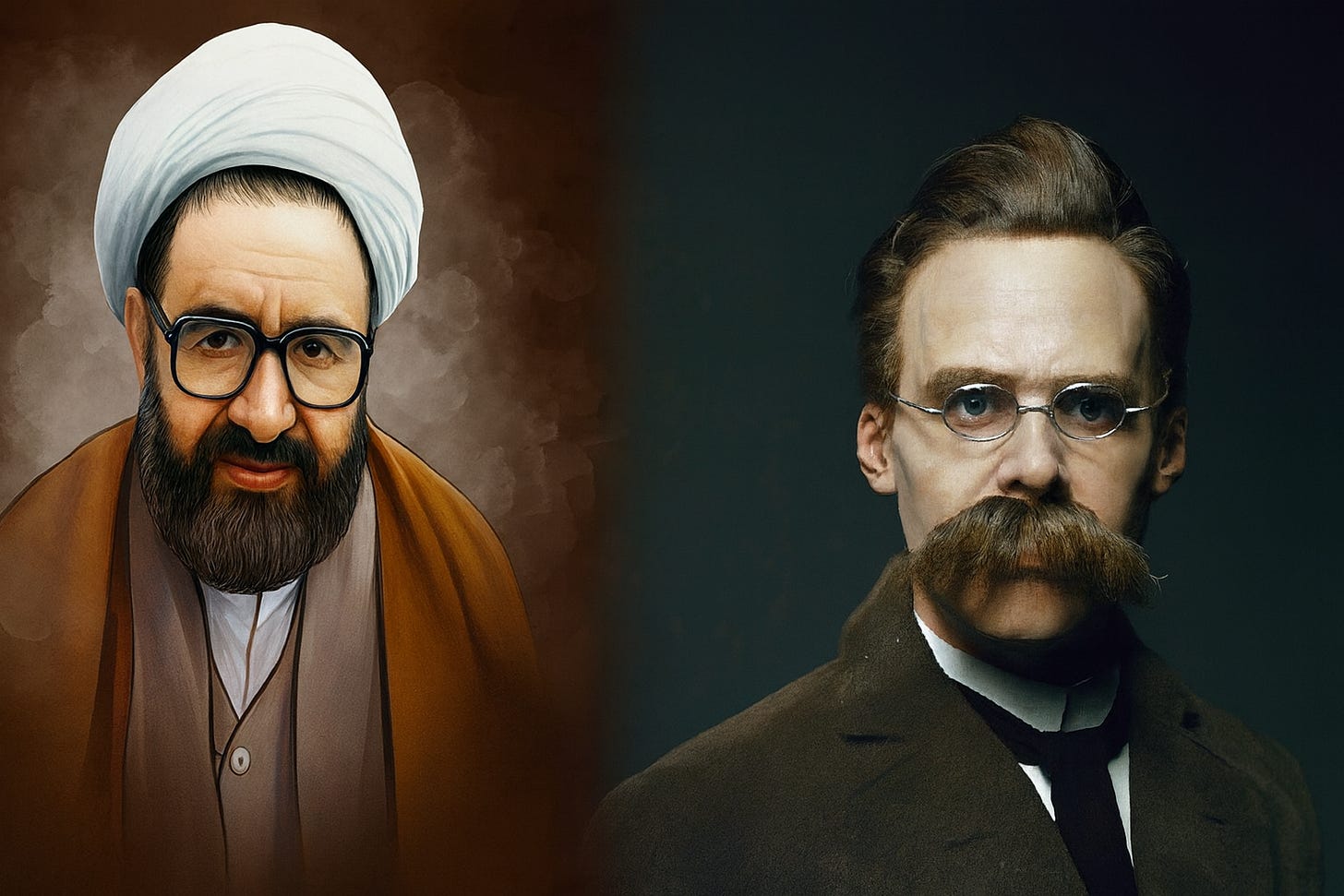The Meaning of Knowledge
A Simple Comparison Between Shaheed Murtaza Mutahhari and Friedrich Nietzsche
Two great thinkers — Shaheed Murtaza Mutahhari, the Islamic scholar and martyr from Iran, and Friedrich Nietzsche, the German philosopher known for challenging traditions — both explored a timeless question:
What is knowledge, and what is it for?
Though they came from different worlds — one rooted in revelation and spirituality, the other in rebellion and reason — both tried to understand how humans know truth, and how that truth shapes their lives.
Shaheed Murtaza Mutahhari: Knowledge as Light and Faith
Shaheed Mutahhari described knowledge not as cold facts, but as a living light — something that shines within the soul and connects the mind to God.
For him, knowledge must transform a person. It should make us humble, compassionate, and more aware of our purpose. True learning doesn’t just fill the head — it refines the heart.
He explained that knowledge in Islam has two sources:
Reason — the power of thinking, reflection, and understanding.
Revelation — the divine light that gives meaning to reason.
When these two work together, a person becomes balanced — guided by both intellect and faith.
Shaheed Mutahhari warned that knowledge without ethics can be dangerous. Science may tell us how to make a weapon, but only morality tells us whether it should ever be used.
“Knowledge without faith,” he wrote, “is like a lamp in the hands of a thief.”
In his view, all truth comes from God. When we learn, we are not inventing truth — we are discovering His signs. Every act of learning is a kind of worship.
For Shaheed Mutahhari, the goal of education is not just to know more, but to become better. The most knowledgeable person is the one who uses their knowledge to serve truth, justice, and humanity.
Nietzsche: Knowledge as Power and Creation
Friedrich Nietzsche saw knowledge very differently.
He believed that there is no single truth waiting to be found. Instead, humans create truth based on how they see the world.
He wrote that “there are no facts, only interpretations.”
To Nietzsche, every person views reality from their own perspective. What we call “truth” is simply the interpretation that has become the most powerful.
Knowledge, then, is not a mirror of the world — it is a tool of creation.
He called this drive the will to power — the inner force that pushes every human being to grow, to dominate, and to give meaning to their life.
For Nietzsche, knowledge is valuable only when it gives life energy, courage, and freedom. He admired those who could question everything and build new values — people who were not afraid to think differently, even if it meant breaking sacred traditions.
He saw the true philosopher not as a servant of truth, but as a creator of meaning.
Two Paths Toward Understanding
Both thinkers believed in the power of the human mind — but they walked in opposite directions.
Shaheed Mutahhari saw knowledge as a reflection of divine truth — something that already exists and can be discovered through reason and faith. Nietzsche, however, saw knowledge as something we create through our own strength, instincts, and interpretations.
In Shaheed Mutahhari’s view, reality comes from God and remains stable and eternal.
In Nietzsche’s view, reality is fluid and changes with the human will.
One calls for humility before the Divine.
The other calls for courage before life.
One sees knowledge as light that guides.
The other sees it as fire that transforms.
Why These Ideas Still Matter Today
We live in an age of information — yet not always of wisdom.
We know more, but we understand less.
Shaheed Mutahhari reminds us that knowledge must always be tied to goodness, justice, and faith. Without these, it becomes empty and even harmful.
He would ask:
“What is the value of education if it doesn’t make us better human beings?”
Nietzsche challenges us not to accept ideas blindly.
He would ask:
“Are you thinking for yourself, or simply repeating others?”
From Shaheed Mutahhari, we learn to seek knowledge with humility and sincerity.
From Nietzsche, we learn to be bold and independent in thought.
Together, they show us that a complete human being needs both:
the light of truth, and 🔥 the courage to live it.
Final Reflection
The real question is not only “What do I know?” —
but “What does my knowledge do to me?”
Shaheed Mutahhari teaches:
“Let your knowledge make you humble before the Creator.”
Nietzsche teaches:
“Let your knowledge make you bold before the world.”
Perhaps true wisdom lies between these two —
to seek truth with the heart of Shaheed Mutahhari and to live it with the courage of Nietzsche.
Because in the end, knowledge is not just what we learn — it is who we become.
Reference: ABNA


